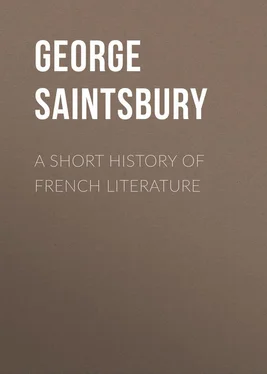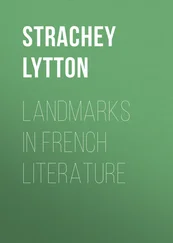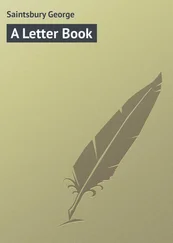George Saintsbury - A Short History of French Literature
Здесь есть возможность читать онлайн «George Saintsbury - A Short History of French Literature» — ознакомительный отрывок электронной книги совершенно бесплатно, а после прочтения отрывка купить полную версию. В некоторых случаях можно слушать аудио, скачать через торрент в формате fb2 и присутствует краткое содержание. ISBN: , Жанр: foreign_prose, на английском языке. Описание произведения, (предисловие) а так же отзывы посетителей доступны на портале библиотеки ЛибКат.
- Название:A Short History of French Literature
- Автор:
- Жанр:
- Год:неизвестен
- ISBN:http://www.gutenberg.org/ebooks/33062
- Рейтинг книги:3 / 5. Голосов: 1
-
Избранное:Добавить в избранное
- Отзывы:
-
Ваша оценка:
- 60
- 1
- 2
- 3
- 4
- 5
A Short History of French Literature: краткое содержание, описание и аннотация
Предлагаем к чтению аннотацию, описание, краткое содержание или предисловие (зависит от того, что написал сам автор книги «A Short History of French Literature»). Если вы не нашли необходимую информацию о книге — напишите в комментариях, мы постараемся отыскать её.
A Short History of French Literature — читать онлайн ознакомительный отрывок
Ниже представлен текст книги, разбитый по страницам. Система сохранения места последней прочитанной страницы, позволяет с удобством читать онлайн бесплатно книгу «A Short History of French Literature», без необходимости каждый раз заново искать на чём Вы остановились. Поставьте закладку, и сможете в любой момент перейти на страницу, на которой закончили чтение.
Интервал:
Закладка:
Later History.
Before quitting the subject of the Chansons de Gestes, it may be well to give briefly their subsequent literary history. They were at first frequently re-edited, the tendency always being to increase their length, so that in some cases the latest versions extant run to thirty or forty thousand lines. As soon as this limit was reached, they began to be turned into prose, the fourteenth and fifteenth centuries being the special period of this change. The art of printing came in time to assist the spread of these prose versions, and for some centuries they were almost the only form in which the Chansons de Gestes, under the general title of romances of chivalry, were known. The verse originals remained for the most part in manuscript, but the prose romances gained an enduring circulation among the peasantry in France. From the seventeenth century their vogue was mainly restricted to this class. But in the middle of the eighteenth the Comte de Tressan was induced to attempt their revival for the Bibliothèque des Romans . His versions were executed entirely in the spirit of the day, and did not render any of the characteristic features of the old Epics. But they drew attention to them, and by the end of the century, University Professors began to lecture on old French poetry. The exertions of M. Paulin Paris, of M. Francisque Michel, and of some German scholars first brought about the re-editing of the Chansons in their original form about half a century ago; and since that time they have received steady attention, and a large number have been published – a number to which additions are yearly being made. Rather more than half the known total are now in print.
CHAPTER III
PROVENÇAL LITERATURE
Langue d'Oc.
The Romance language, spoken in the country now called France, has two great divisions, the Langue d'Oc and the Langue d'Oil 44 44 Oc and oil ( hoc and hoc illud ), the respective terms indicating affirmation. In this chapter the information given is based on a smaller acquaintance at first hand with the subject than is the case in the chapters on French proper. Herr Karl Bartsch has been the guide chiefly followed.
, which stand to one another in hardly more intimate relationship than the first of them does to Spanish or Italian. In strictness, the Langue d'Oc ought not to be called French at all, inasmuch as those who spoke it applied that term exclusively to Northern speech, calling their own Limousin, or Provençal, or Auvergnat. At the time, moreover, when Provençal literature flourished, the districts which contributed to it were in very loose relationship with the kingdom of France; and when that relationship was drawn tighter, Provençal literature began to wither and die. Yet it is not possible to avoid giving some sketch of the literary developments of Southern France in any history of French literature, as well because of the connection which subsisted between the two branches, as because of the altogether mistaken views which have been not unfrequently held as to that connection. Lord Macaulay 45 45 Essay on Ranke's History of the Popes.
speaks of Provençal in the twelfth century as 'the only one of the vernacular languages of Europe which had yet been extensively employed for literary purposes;' and the ignorance of their older literature which, until a very recent period, distinguished Frenchmen has made it common for writers in France to speak of the Troubadours as their own literary ancestors. We have already seen that this supposition as applied to Epic poetry is entirely false; we shall see hereafter that, except as regards some lyrical developments, and those not the most characteristic, it is equally ill-grounded as to other kinds of composition. But the literature of the South is quite interesting enough in itself without borrowing what does not belong to it, and it exhibits not a few characteristics which were afterwards blended with those of the literature of the kingdom at large.
Range and characteristics.
The domain of the Langue d'Oc is included between two lines, the northernmost of which starts from the Atlantic coast at or about the Charente, follows the northern boundaries of the old provinces of Perigord, Limousin, Auvergne, and Dauphiné, and overlaps Savoy and a small portion of Switzerland. The southern limit is formed by the Pyrenees, the Gulf of Lyons, and the Alps, while Catalonia is overlapped to the south-west just as Savoy is taken in on the north-east. This wide district gives room for not a few dialectic varieties with which we need not here busy ourselves. The general language is distinguished from northern French by the survival to a greater degree of the vowel character of Latin. The vocabulary is less dissolved and corroded by foreign influence, and the inflections remain more distinct. The result, as in Spanish and Italian, is a language more harmonious, softer, and more cunningly cadenced than northern French, but endowed with far less vigour, variety, and freshness. The separate development of the two tongues must have begun at a very early period. A few early monuments, such as the Passion of Christ 46 46 See chap. i.
and the Mystery of the Ten Virgins 47 47 See chap. x.
, contain mixed dialects. But the earliest piece of literature in pure Provençal is assigned in its original form to the tenth century, and is entirely different from northern French 48 48 The poem on Boethius. See chap. i.
. It is arranged in laisses and assonanced. The uniformity, however, of the terminations of Provençal makes the assonances more closely approach rhyme than is the case in northern poetry. Of the eleventh century the principal monuments are a few charters, a translation of part of St. John's Gospel, and several religious pieces in prose and verse. Not till the extreme end of this century does the Troubadour begin to make himself heard. The earliest of these minstrels whose songs we possess is William IX, Count of Poitiers. With him Provençal literature, properly so called, begins.
Periods of Provençal Literature.
The admirable historian of Provençal literature, Karl Bartsch, divides its products into three periods; the first reaching to the end of the eleventh century, and comprising the beginnings and experiments of the language as a literary medium; the second covering the twelfth and thirteenth centuries, the most flourishing time of the Troubadour poetry, and possessing also specimens of many other forms of literary composition; the third, the period of decadence, including the fourteenth and fifteenth centuries, and remarkable chiefly for some religious literature, and for the contests of the Toulouse school of poets. In a complete history of Provençal literature notice would also have to be taken of the fitful and spasmodic attempts of the last four centuries to restore the dialect to the rank of a literary language, attempts which have never been made with greater energy and success than in our own time 49 49 By the school of the so-called Félibres , of whom Mistral and Aubanel are the chief.
, but which hardly call for notice here.
First Period.
The most remarkable works of the first period have been already alluded to. This period may possibly have produced original epics of the Chanson form, though, as has been pointed out, no indications of any such exist, except in the solitary instance of Girartz de Rossilho . The important poem of Auberi of Besançon on Alexander is lost, except the first hundred verses. It is thought to be the oldest vernacular poem on the subject, and is in a mixed dialect partaking of the forms both of north and south. Hymns, sometimes in mixed Latin and Provençal, sometimes entirely in the latter, are found early. A single prose monument remains in the shape of a fragmentary translation of the Gospel of St. John. But by far the most important example of this period is the Boethius . The poem, as we have it, extends to 238 decasyllabic verses arranged on the fashion of a Chanson de Geste, and dates from the eleventh century, or at latest from the beginning of the twelfth, but is thought to be a rehandling of another poem which may have been written nearly two centuries earlier. The narrative part of the work is a mere introduction, the bulk of it consisting of moral reflections taken from the De Consolatione .
Читать дальшеИнтервал:
Закладка:
Похожие книги на «A Short History of French Literature»
Представляем Вашему вниманию похожие книги на «A Short History of French Literature» списком для выбора. Мы отобрали схожую по названию и смыслу литературу в надежде предоставить читателям больше вариантов отыскать новые, интересные, ещё непрочитанные произведения.
Обсуждение, отзывы о книге «A Short History of French Literature» и просто собственные мнения читателей. Оставьте ваши комментарии, напишите, что Вы думаете о произведении, его смысле или главных героях. Укажите что конкретно понравилось, а что нет, и почему Вы так считаете.












